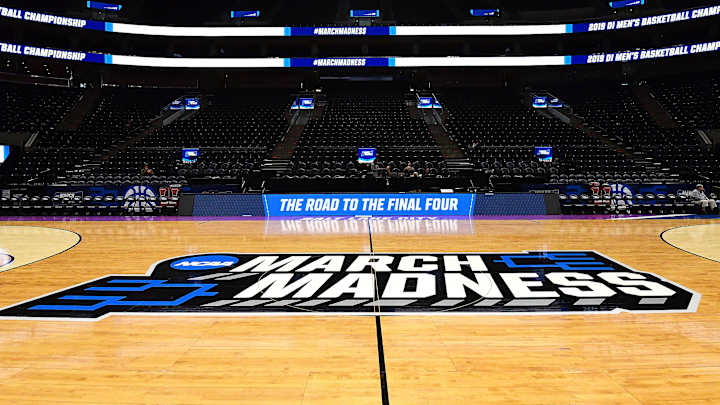Cancellation of March Madness Hurts a Little More Than The Rest

Editor's note: Thursday night after this article was published, the PGA canceled the final three rounds of the Players Championship and all of its upcoming events until the Masters, which begin April 9.
There was a fundamental change in the United States’s approach to the coronavirus Thursday. It explains why we began with most men’s basketball conference tournaments being played and ended with the NCAA tournament canceled. Follow the change and you can see why baseball closed spring training complexes and why the PGA Tour should stop its signature event, the Players Championship, immediately.
We began the day thinking about doctor-recommended safety measures. We ended it in what you might call an emergency of our national state of mind. Suddenly, limiting large gatherings and washing our hands a bunch wasn’t enough; the nation, collectively, got terrified, and ultimately that will be for the best.
How did this affect sports? Well, when we were just worried about following doctor’s orders, it made sense to hold the NCAA tournaments in near-empty arenas. Those would be small gatherings with limited person-to-person exposure. Closing the arenas was a huge, proactive measure. Remember: As of Tuesday, almost nobody was willing to do it.
But we are beyond that now. The country finally realized: We not only have no idea how big this pandemic will become, we have no idea how big it is right now. We have conducted so few tests that any stat about the number of cases in this country is essentially bogus.
Imagine somebody saying the Lakers have won 12 games this season, then admitting they only watched the first month. Would you consider that a real stat? That’s what is happening with coronavirus. We’re not testing enough, so we don’t know what the real numbers are. But we can assume they are exponentially higher than what has been reported.
This creates fear, as it should. Once Utah Jazz stars Rudy Gobert and Donovan Mitchell contracted the coronavirus, and Canadian Prime Minister Justin Trudeau went into self-imposed isolation, and Ohio's department of health estimated more than 100,000 Ohioans have the virus, we had to admit: This is probably everywhere in North America already. Asking students to participate in the very sport that Gobert and Mitchell play felt outrageous.
And so university leaders around the country decided they couldn’t be cautious enough. They canceled pretty much everything, so quickly that it was hard to keep track of which dominoes fell first.
There was no more cost-benefit analysis, no more studying of doctor’s orders. It was just: cancel, cancel, cancel. A few days ago, NCAA tournaments felt too big to cancel. But now there was the urge to do as much as we could, for peace of mind as much as anything. Whatever you do, don’t go halfway.
This is what happened outside of sports, too. Ohio governor Mike DeWine, who has distinguished himself as much as any politician during this crisis, closed schools for the whole state. Other states followed. Soon virtually all schools in the country may be closed. Broadway is shut down. Disneyland is closed. Concert tours have been canceled or will be soon.
So now it’s not just about following doctor’s orders. The United States of America has paused everyday life.
In that environment, you just can’t hold a major sporting event. You look insensitive and oblivious, and you embarrass yourself. The NBA and NHL and MLB all get that now. In two or three weeks, they will hopefully know how widespread COVID-19 is, and if the nation has calmed down. Then they can revisit their plans.
This is why the PGA Tour should do the only sensible thing and halt the Players Championship. All week, the Tour has been the last sports organization to find a clue – the entire first round Thursday was played in front of spectators.
The Tour finally announced Thursday that it would play without spectators starting Friday, and for the foreseeable future … and that would be fine if we were all just following doctor’s orders. Unlike basketball players, golfers don’t have to touch each other. They don’t use each other’s equipment. They can and usually do travel in very small parties. If there are no spectators, the best golfers in the world can practice proper social-distancing and play four rounds of golf.
But doing that now is like bringing your birthday cake to a funeral. It is unseemly. Reluctantly and too late, the country has decided that the coronavirus is our top priority, and now there are so many tests to distribute and people to quarantine, and it just feels wrong to have anybody fist-pumping after making a 20-foot putt.
Golf tournaments are just not that hard to reschedule. The Tour could finish the Players in a few months. If Augusta National says the Masters is now scheduled for October, then guess what? Tiger and friends will still show up. We will still watch.
This year’s NCAA tournaments, sadly, are lost forever. That is a greater loss than a potentially canceled NBA or NHL season, because the best players in those sports get paid very well and have long careers. College basketball players get, at most, four cracks at a lifetime memory. Thursday was a terrible day for them, one they will never forget. Nobody wanted to see this. But everybody should understand why it happened.

Michael Rosenberg is a senior writer for Sports Illustrated, covering any and all sports. He writes columns, profiles and investigative stories and has covered almost every major sporting event. He joined SI in 2012 after working at the Detroit Free Press for 13 years, eight of them as a columnist. Rosenberg is the author of "War As They Knew It: Woody Hayes, Bo Schembechler and America in a Time of Unrest." Several of his stories also have been published in collections of the year's best sportswriting. He is married with three children.
Follow rosenberg_mike